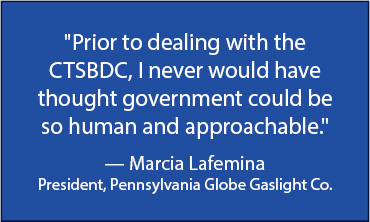
This article first appeared in the UConn Business magazine, Volume 4, Issue 3 (Summer 2014)
The sudden death of her father was a horrible personal tragedy for Dorothy Carlone’01 MBA and her family. But for the 14 dedicated employees at General Machine Co. in Berlin, pain mixed with panic, knowing that the company Walter Grzegorzek founded might not survive without him.
“You could just see the fear in their eyes,” Carlone said of that day in October 2011 when she broke the news. “The economy was bad, they had invested most of their lives in this business, and they didn’t know what our intentions were.
“We had huge orders pending with Hamilton Sundstrand that we needed to fulfill,” she said. “At the very least we had to keep going for a few months until our employees could find other jobs.”
Almost three years later, the company is thriving. General Machine has bought new equipment, is purchasing its own building in Southington, and is poised to bid on military contracts. “The future is promising,” Carlone said.
A Helping Hand with the American Dream
The Connecticut Small Business Development Center (CTSBDC), a free and confidential program offered to businesses with 500 or fewer employees, played a large role in General Machine’s evolution.
“Our job is to help fulfill the American dream,” said Emily Carter, state director of the CTSBDC. “We are there for small-business owners through the whole process—whether it is getting money to expand or setting in motion a dream of owning a restaurant on Main Street.”
The program is funded by the U.S. Small Business Administration, the Connecticut Department of Economic and Community Development and the University of Connecticut. The headquarters is now located within the UConn School of Business in Storrs, and there are 15 other locations in the state, many on UConn campuses.
In just the first quarter of this year, the CTSBDC’s offices had more than 400 active clients and fielded more than 700 inquiries. Carter hopes that as the program becomes more well-known, that number will skyrocket.
“We don’t have a typical day or a typical client,” Carter said. “We have people who walk in and say, ‘I just lost my job. I have a lawn mower and I want to start a lawn-service business’ to a professor who thinks he or she can cure cancer.”
The CTSBDC employs experts in everything from finance to agriculture, marketing to management, she said. Small business is and will continue to be the driving force in the economy, Carter said.
Time and again, entrepreneurs make a difference in discovery, innovation and creativity, she said. But often they don’t have the luxury of spending months mulling over a decision, researching a financing option, hiring experts, or assigning a team of people to investigate the best way to update a web site.
CTSBDC adviser Shelly Koehler was there within days after General Machine called seeking help.
“Shelly took time to learn about our history, product line, present situation and aspirations,” Carlone said. “She evaluated General Machine’s financial position and provided a detailed analysis of where things are going well, where there’s room for improvement, and where we can grow.

“It’s good to know that someone has your back,” said Carlone, who is now General Machine’s business manager. Although she had earned an MBA from UConn in 2001, Carlone’s career path had been heading toward education prior to her father’s death. Her mother, Mary Grzegorzek, Walter’s wife, stepped up as president, but there were aspects of the job that she had to learn. Carlone’s brother, Ray Grzegorzek, helps with the business and is a full-time police officer.
“I was surprised that this much help was available,” Carlone said. “You often hear bad things about doing business in Connecticut, but this is a great program and it shows that the state really wants to help small businesses like my own.”
The family takes a great deal of pride in keeping Walter Grzegorzek’s work alive.
“I’m very proud of what my father accomplished,” Carlone said. “He came here from another country, not speaking the language, and here we are… his little company, securing contracts with UTC and NASA. This is very important work. I really appreciate what he built.”
A Light at the End of the (Business) Tunnel
Don’t let the name fool you. Pennsylvania Globe Gaslight Co. of North Branford is a family-owned, environmentally friendly, Connecticut-based company that has designed and manufactured indoor and outdoor lighting since 1995. In fact, it is the exclusive supplier to the University of Connecticut campus.
As the president of the business, Marcia Lafemina has plenty to worry about—in addition to financing.
“We had a growth spurt in 2012 and that’s when we reached out to the Small Business Development Center,” Lafemina said. The company had received a large order on a tight deadline, and needed more money for labor costs and new equipment.
CTSBDC adviser Christopher Pisarz helped the company apply for a $100,000 matching grant, which it received in just a few months. He also helped Lafemina prepare a new business plan and budget. In return, the company pledged to use a percentage of its financial assistance to bring contracted work back to Connecticut from out-of-state.
“In this tough economy, we appreciate any help we can get,” Lafemina said. “Prior to dealing with the CTSBDC, I never would have thought that government could be so human and approachable.”
Since 2012, Pennsylvania Globe Gaslight has hired three new employees, bringing the staff to 15. Last year, sales were up nine percent.
“We feel very fortunate to be the lighting supplier for UConn. We are a Connecticut business. I think people like knowing that they are paying their taxes and the money is generating business within the state,” she said. “It’s just an overall win.”
Financing is the Top Concern
For most small businesses, like Pennsylvania Globe Gaslight Co., accessing capital is the number one request for help, Carter said.
“Our teams know all about loan programs so the customer doesn’t have to devote months to researching it themselves,” she said. “We have taken the burden out of that process and tried to cut out the run-around. Entrepreneurs want everything done as quickly as possible. Our goal is no ‘hand-offs’ and to decrease frustration for the companies.”
Another goal of the CTSBDC is to help companies increase their exports by having trade advisers available. The organization also offers emergency preparedness training.
“We’ve all learned it isn’t advisable to wait for the next hurricane to think about what the business would do if the data was lost or the power is out for a week,” Carter said. “We try to prepare for business interruptions of any kind. The small business community is way behind in getting those plans in place.”
The location on the UConn campus makes it ideal for both alumni and students, Carter said. She welcomes alumni who are interested in starting a small business, connecting with other entrepreneurs, or investing in a new company.
UConn students are also benefitting from the program. Currently the CTSBDC employs four student advisers who are gaining experience working with small business clientele. A student intern is helping with Facebook and other social media inquiries.
Long-term Care Required Long-term Plan
Kristin Delfau knows a few things about juggling a busy schedule. She runs Delfau Tax & Financial Services, from her Danbury home, while taking care of her children. She is also the author of a book titled Turbo-Mom’s Guide to Saving Money Without Wasting Time.
With the help of CTSBDC business adviser Nelson Merchan, Delfau updated her website and platform, optimized search terms, and looked at ways to attract more life and long-term care insurance customers by networking with other professionals whose clients were interested in her services.
“With my CTSBDC adviser’s help, I’ve built a business model that allows me to understand what works best for my company and to grow each year at a sustainable rate,” she said. “He is someone I can bounce ideas off of and get honest feedback.”
Also, knowing that she has an appointment with her adviser keeps her on track with her business to-do list. “It’s like going to Weight Watchers,” she joked. “You don’t want to go and have gained weight. I don’t want to attend a meeting without making progress.”
Delfau said she found CTSBDC on her own after conducting online research. She wishes more business owners knew about the service.
“Because they are paid counselors, they have ‘skin in the game,'” she said. “They truly have a vested interest in helping other people and helping their businesses move forward.”
The Connecticut Small Business Development Center is funded in part through a cooperative agreement with the U.S. Small Business Administration, the Connecticut Department of Economic and Community Development and the University of Connecticut.